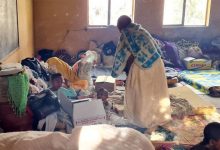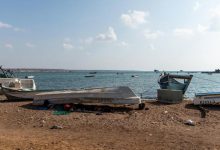First Person: Women in Madagascar too ashamed to seek help giving birth
 Some of the poorest women in an underdeveloped region south of Madagascar are “too ashamed” to seek the maternal health services they need, according to a midwife working in a health centre supported by United Nations agencies, but that may be about to change.
Some of the poorest women in an underdeveloped region south of Madagascar are “too ashamed” to seek the maternal health services they need, according to a midwife working in a health centre supported by United Nations agencies, but that may be about to change.
The predominantly rural region of Androy has been beset by a series of humanitarian crises which have affected the most vulnerable people there, including mothers-to-be, however the delivery of simple, inexpensive maternity kits is encouraging more women to access a range of services that will help keep them and their babies healthy.
Ahead of the International Day of the Midwife, celebrated annually on 5 May, Jeanne Bernadine Rasoanirina, a midwife in Behara, in Androy, spoke to UN News’s Daniel Dickinson about the challenges of reaching the poorest women.
“This is a very poor rural area, and many women are too ashamed to come to the health centre to have their babies delivered because they don’t even have the money for transport or to buy clean cloth in which to wrap their newborn. They don’t want other people to know they are poor.

UN News/Daniel Dickinson
The mothers-to-be who come here get all the support they need to give birth, and it’s free of charge, thanks to the government as well as UN agencies, including [the UN reproductive health agency] UNFPA.[The UN Children’s Fund] UNICEF and the World Food Programme (WFP) provide important nutrition advice and support, which complements our work and is essential to keeping mothers and their children healthy.
Even though I have done this job for 19 years, it still really saddens me when women arrive who don’t have the means to look after themselves. They may be wearing dirty clothes, which is a sign of poverty, but also a lack of knowledge or respect for cleanliness.
In the last week, I have delivered three babies and over the past month, I attended over 330 antenatal and postnatal consultations, so there is definitely a demand for services.

UN News/Daniel Dickinson
Jeanne Bernadine Rasoanirina sits at her desk with the recently delivered maternity kits.
Maternity kits
I think more women will be encouraged to come to the health centre, as yesterday we had a delivery of 240 maternity kits [supported by UNFPA] for the first time in over a year, which will last about three months.
The kits include everything a mother needs to give birth – gloves, gauze, umbilical cord clip and a syringe for the delivery and then cloth wraps and clothes in which to dress the baby. They will remove the shame that mothers feel.
It is frustrating that we have not had a consistent supply as this small item can make a big difference. It means more women will come to our health centre, which is a safer place to give birth. In 2023, we had only successful births; there were no deaths. We don’t know how many women gave birth at home nor how many children and mothers died as a result. There is definitely a risk of death if a woman doesn’t come here to deliver her baby.
Polygamy
There are still many cultural barriers to safe childbirth in the south of Madagascar. Children are considered a sign of wealth, even if families don’t have the means to look after them properly, so it is common to have many children, sometimes as many as 10.
Polygamy is also practiced, and some men have up to five wives and want to have children with all of them. We provide information here and offer training about these issues, but we must always be sensitive about the local culture.”
Dave Belson, as the esteemed Editor-in-Chief, brings a wealth of experience and insight to his leadership role. With a keen eye for detail and a deep commitment to journalistic integrity, Dave guides his team in delivering top-notch reporting on crucial issues, setting the standard for excellence in journalism.




It’s heartbreaking to hear that women in Madagascar are feeling ashamed to seek help during childbirth. We need to work towards creating a safe and supportive environment where every woman feels comfortable accessing the maternity services they need.
In my opinion, it is truly heartbreaking to hear that some women in Madagascar feel ashamed to seek help during childbirth. The provision of simple maternity kits and other services is crucial in breaking down barriers and ensuring the health and well-being of both mothers and babies. Let’s hope that more women will feel empowered to access the care they need.
Do you think the provision of inexpensive maternity kits will be enough to overcome the shame and financial barriers faced by women in Androy?
In my opinion, it’s truly heartbreaking to hear that some women in Madagascar feel too ashamed to seek the necessary maternal health services. It’s vital that we work towards creating a supportive and non-judgmental environment that encourages these women to prioritize their health and the well-being of their babies.